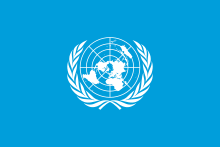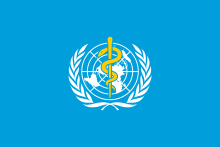Universal Declaration of Human Rights
Jump to navigation
Jump to search

The Universal Declaration of Human Rights is a declaration adopted by the United Nations General Assembly on 10 December 1948.
Quotes[edit]


- the advent of a world in which human beings shall enjoy freedom of speech and belief and freedom from fear and want has been proclaimed as the highest aspiration of the common people, Whereas it is essential, if man is not to be compelled to have recourse, as a last resort, to rebellion against tyranny and oppression, that human rights should be protected by the rule of law, Whereas it is essential to promote the development of friendly relations between nations, Whereas the peoples of the United Nations have in the Charter reaffirmed their faith in fundamental human rights, in the dignity and worth of the human person and in the equal rights of men and women and have determined to promote social progress and better standards of life in larger freedom, Whereas Member States have pledged themselves to achieve, in co-operation with the United Nations, the promotion of universal respect for and observance of human rights and fundamental freedoms, Whereas a common understanding of these rights and freedoms is of the greatest importance for the full realization of this pledge.
- The General Assembly
Proclaims this Universal Declaration of Human Rights as a common standard of achievement for all peoples and all nations, to the end that every individual and every organ of society, keeping this Declaration constantly in mind, shall strive by teaching and education to promote respect for these rights and freedoms and by progressive measures, national and international, to secure their universal and effective recognition and observance, both among the peoples of Member States themselves and among the peoples of territories under their jurisdiction.- Preamble
- All human beings are born free and equal in dignity and rights. They are endowed with reason and conscience and should act towards one another in a spirit of brotherhood.
- Article 1
- Everyone is entitled to all the rights and freedoms set forth in this Declaration, without distinction of any kind, such as race, colour, sex, language, religion, political or other opinion, national or social origin, property, birth or other status.
Furthermore, no distinction shall be made on the basis of the political, jurisdictional or international status of the country or territory to which a person belongs, whether it be independent, trust, non-self-governing or under any other limitation of sovereignty.- Article 2
- Everyone has the right to life, liberty and the security of person.
- Article 3
- No one shall be held in slavery or servitude; slavery and the slave trade shall be prohibited in all their forms.
- Article 4
- No one shall be subjected to torture or to cruel, inhuman or degrading treatment or punishment.
- Article 5
- All are equal before the law and are entitled without any discrimination to equal protection of the law. All are entitled to equal protection against any discrimination in violation of this Declaration and against any incitement to such discrimination.
- Article 7
- Everyone has the right to own property alone as well as in association with others. No one shall be arbitrarily deprived of his property.
- Article 17
- Everyone has the right to freedom of thought, conscience and religion; this right includes freedom to change his religion or belief, and freedom, either alone or in community with others and in public or private, to manifest his religion or belief in teaching, practice, worship and observance.
- Article 18
- Everyone has the right to freedom of opinion and expression; this right includes freedom to hold opinions without interference and to seek, receive and impart information and ideas through any media and regardless of frontiers.
- Article 19
- Everyone has the right to freedom of peaceful assembly and association.
- Article 20
- Everyone has the right to a standard of living adequate for the health and well-being of himself and of his family, including food, clothing, housing and medical care and necessary social services, and the right to security in the event of unemployment, sickness, disability, widowhood, old age or other lack of livelihood in circumstances beyond his control.
- Article 25
- Everyone has the right to education... Education shall be directed to the full development of the human personality and to the strengthening of respect for human rights and fundamental freedoms. It shall promote understanding, tolerance and friendship... Parents have a prior right to choose the kind of education that shall be given to their children.
- Article 26
Quotes about the Universal Declaration of Human Rights[edit]
- The UDHR was much less “Western” than many believe, and reading it through the lenses of an alleged opposition of the West versus the rest makes for [maliciously] ideological, inaccurate interpretation.
- Massimo Introvigne, China’s Secret Weapon: Changing the Meaning of “Human Rights”, Bitter Winter (February 26, 2021)
- On 10 December 1948, the Universal Declaration of Human Rights was adopted by the UN General Assembly gathered in... Paris... Eleanor Roosevelt, chair of the agreement’s drafting committee, described it as an “international Magna Carta for all mankind,” and member states pledged “to achieve ...the promotion of universal respect for and observance of human rights and fundamental freedoms.” It was the first international agreement on the basic principles of human rights.
- The Guardian UN adopts Universal Declaration of Human Rights – archive, December 1948; Guardian (28 Nov 2018)
- The legacy of the UDHR can never be underestimated. It is a landmark document that “proclaimed the inalienable rights which everyone is inherently entitled to as a human being -- regardless of race, color, religion, sex, language, political or other opinion, national or social origin, property, birth or other status.” It was the direct response to the heinous crimes perpetrated by the Nazis and a much-needed affirmation of human rights for everyone everywhere.
- Ewelina U. Ochab in Affirm Human Dignity For Everyone Everywhere And Stand Up For Human Rights, Forbes (7 December 2018)
- Where, after all, do universal human rights begin? In small places, close to home — so close and so small that they cannot be seen on any maps of the world. Yet they are the world of the individual person; the neighborhood he lives in; the school or college he attends; the factory, farm or office where he works. Such are the places where every man, woman and child seeks equal justice, equal opportunity, equal dignity without discrimination. Unless these rights have meaning there, they have little meaning anywhere. Without concerned citizen action to uphold them close to home, we shall look in vain for progress in the larger world.
- Eleanor Roosevelt from a speech "The Great Question" delivered at the United Nations in New York on March 27, 1958, as quoted in "Roosevelt on Human Rights in the Small Places", Harper's Magazine (December 2, 2007)
- Just months after its founding, the UN also formed its Human Rights Commission, chaired by former First Lady Eleanor Roosevelt, to draft the landmark Universal Declaration of Human Rights adopted in Paris on December 10, 1948. In addition, instead of firing squads for the defeated Axis leaders, the United States led the Allies in convening tribunals at Nuremburg and Tokyo in 1945-1946 that tried their war crimes under international law. Three years later, Washington joined the international community in adopting the four modern Geneva conventions that laid down the laws of war for future conflicts to protect both captives and civilians.
- We just heard from the Minister of Honduras. Let us recall that United Fruit Company essentially ran his country for a long time. United Fruit’s attorney was US Secretary of State John Foster Dulles, and his brother Allen Dulles was the head of the CIA. On behalf of United Fruit Company, the two Dulles Brothers conspired to overthrow President Jacobo Árbenz of Guatemala, next door to Honduras, in order to stop the land reforms that Árbenz was trying to implement.
So, yes, we have a global food system, but we need a different system. That different system must be based on the principle of universal human dignity in the Universal Declaration of Human Rights, the principle of national sovereignty in the UN Charter, and the economic rights in the Universal Declaration and the International Covenant of Economic, Social, and Cultural Rights. In the Universal Declaration, all governments agreed that social protection is a human right, not merely a “nice thing,” or a pleasant thing, but a basic human right. That was 73 years ago.
The Sustainable Development Goals are our generation's pledge to honor the Universal Declaration of Human Rights. Yet I come from a country that not only doesn't care about the world's poor, it doesn't even care about its own poor. One in seven Americans is hungry right now, but one political party cares about little more than cutting taxes for the rich and filibustering any real solutions to poverty.- Jeffrey Sachs' speech at the UN Food Systems Pre-summit, Speech transcript (July 27, 2021)
- It was the Americans who first discovered how the UN could serve their Cold War purposes. The text of the UN’s Universal Declaration of Human Rights was passed in 1948 by a coalition of American New Dealers, western European liberals, and postcolonial elites, with the Soviets unable to block it. They in the end abstained from the vote, along with seven other states. Forty-eight voted in favor. The Chilean representative summed up the conflict in distinct terms: “The views expressed by the Polish representative and shared by the USSR delegation resulted from a different conception of life and man. The draft declaration rested on the assumption that the interests of the individual came before those of the State and that the State should not be allowed to deprive the individual of his dignity and his basic rights. The opposing conception was that the rights of the individual must give precedence to the interests of society.” The declaration may not have had much practical significance in the first decades of the Cold War, but its adaptation was a victory for the United States over Soviet concepts of rights.
- Odd Arne Westad, The Cold War: A World History (2017)
See also[edit]
- Activism
- Compassion
- Cooperation
- Education
- Food
- Healthcare
- Human rights
- Sharing
- Shelter
- Maslow's hierarchy of needs
- Rule of law
- Youth activism
- United Nations
- Unity


